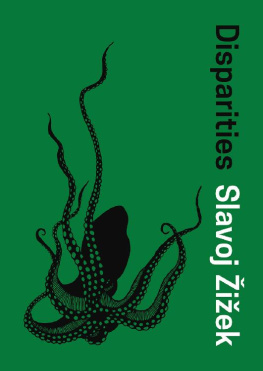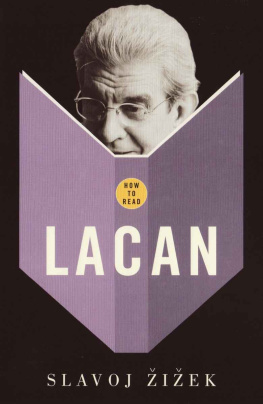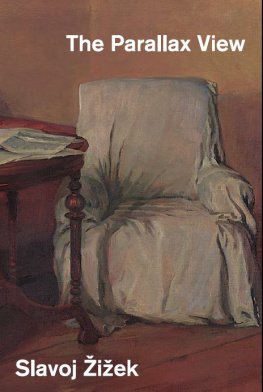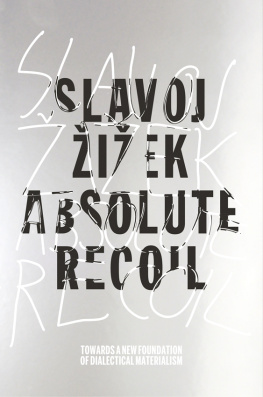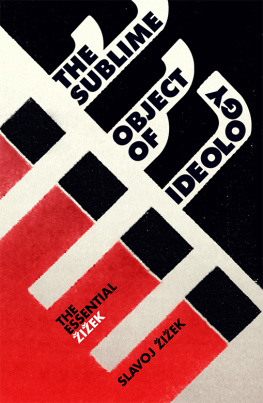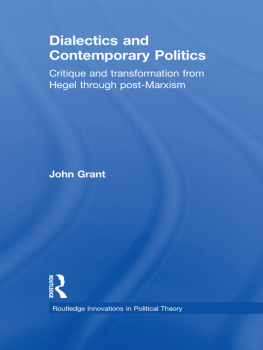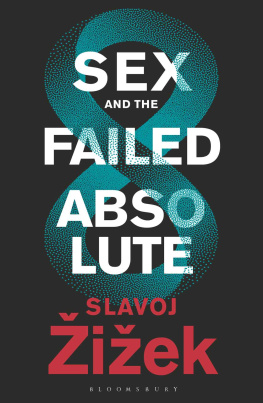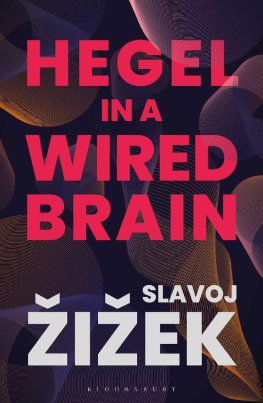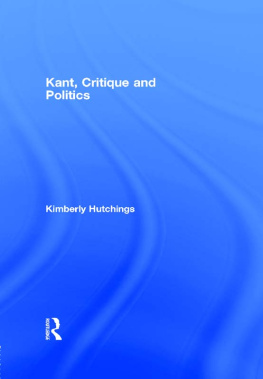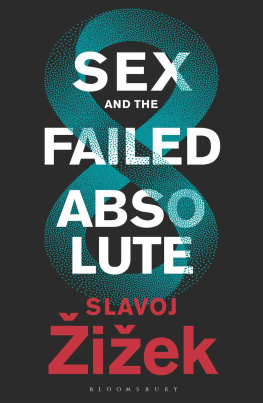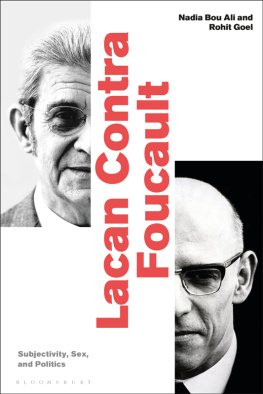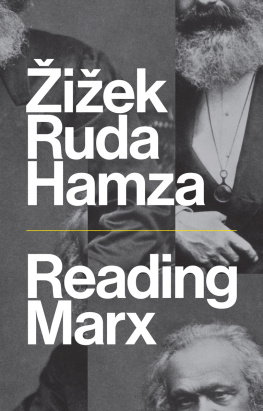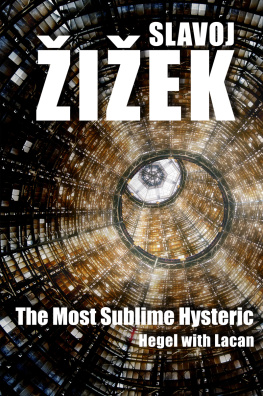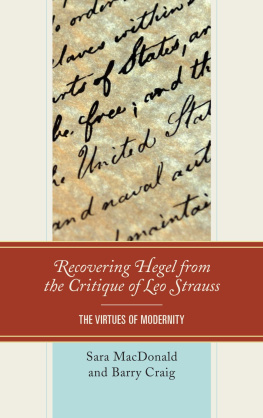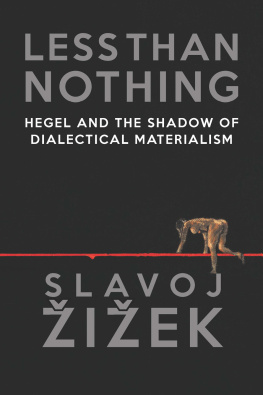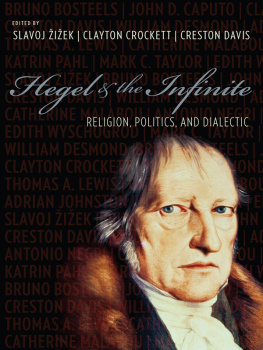Slavoj Žižek - Tarrying with the Negative
Here you can read online Slavoj Žižek - Tarrying with the Negative full text of the book (entire story) in english for free. Download pdf and epub, get meaning, cover and reviews about this ebook. year: 1993, publisher: Duke University Press Books, Zizek, Slavoj, genre: Religion. Description of the work, (preface) as well as reviews are available. Best literature library LitArk.com created for fans of good reading and offers a wide selection of genres:
Romance novel
Science fiction
Adventure
Detective
Science
History
Home and family
Prose
Art
Politics
Computer
Non-fiction
Religion
Business
Children
Humor
Choose a favorite category and find really read worthwhile books. Enjoy immersion in the world of imagination, feel the emotions of the characters or learn something new for yourself, make an fascinating discovery.

- Book:Tarrying with the Negative
- Author:
- Publisher:Duke University Press Books, Zizek, Slavoj
- Genre:
- Year:1993
- Rating:5 / 5
- Favourites:Add to favourites
- Your mark:
- 100
- 1
- 2
- 3
- 4
- 5
Tarrying with the Negative: summary, description and annotation
We offer to read an annotation, description, summary or preface (depends on what the author of the book "Tarrying with the Negative" wrote himself). If you haven't found the necessary information about the book — write in the comments, we will try to find it.
Abstract: A theoretical analysis of social conflict that uses examples from Kant, Hegel, Lacan, popular culture and contemporary politics to critique nationalism.
Tarrying with the Negative — read online for free the complete book (whole text) full work
Below is the text of the book, divided by pages. System saving the place of the last page read, allows you to conveniently read the book "Tarrying with the Negative" online for free, without having to search again every time where you left off. Put a bookmark, and you can go to the page where you finished reading at any time.
Font size:
Interval:
Bookmark:
Tarrying with the Negative
Post-Contemporary Interventions
Series Editors:
Stanley Fish and Fredric Jameson


Lacking strength, Beauty hates the Understanding for asking of her what it cannot do. But the life of Spirit is not the life that shrinks from death and keeps itself untouched by devastation, but rather the life that endures it and maintains itself in it. It wins its truth only when, in utter dismemberment, it finds itself. This tarrying with the negative is the magical power that converts it into being. G. W. F. Hegel, "Preface" to Phenomenology of Spirit
Tarrying with the Negative
Introduction
The most sublime image that emerged in the political upheavals of the last yearsand the term "sublime" is to be conceived here in the strictest Kantian sensewas undoubtedly the unique picture from the time of the violent overthrow of Ceausescu in Romania: the rebels waving the national flag with the red star, the Communist symbol, cut out, so that instead of the symbol standing for the organizing principle of the national life, there was nothing but a hole in its center. It is difficult to imagine a more salient index of the "open" character of a historical situation "in its becoming," as Kierkegaard would have put it, of that intermediate phase when the former Master-Signifier, although it has already lost the hegemonical power, has not yet been replaced by the new one. The sublime enthusiasm this picture bears witness to is in no way affected by the fact that we now know how the events were actually manipulated (ultimately it had to do with a coup of Securitate, the Communist secret police, against itself, against its own signifier; that is, the old apparatus survived by casting off its symbolic clothing): for us as well as for most of the participants themselves, all this became visible in retrospect, and what really matters is that the masses who poured into the streets of Bucharest "experienced" the situation as "open," that they participated in the unique intermediate state of passage from one discourse (social link) to another, when, for a brief, passing moment, the hole in the big Other, the symbolic order, became visible. The enthusiasm which carried them was literally the enthusiasm over this hole, not yet hegemonized by any positive ideological project; all ideological appropria tions (from the nationalistic to the liberal-democratic) entered the stage afterwards and endeavored to "kidnap" the process which originally was not their own. At this point, perhaps, the enthusiasm of the masses and the attitude of a critical intellectual overlap for a brief moment. And the duty of the critical intellectualif, in today's "postmodern" universe, this syntagm has any meaning leftis precisely to occupy all the time, even when the new order (the "new harmony") stabilizes itself and again renders invisible the hole as such, the place of this hole, i.e., to maintain a distance toward every reigning Master-Signifier. In this precise sense, Lacan points out that, in the passage from one discourse (social link) to another, the "discourse of the analyst" always emerges for a brief moment: the aim of this discourse is precisely to "produce" the Master-Signifier, that is to say, to render visible its "produced," artificial, contingent character.1
This maintaining of a distance with regard to the Master-Signifier characterizes the basic attitude of philosophy. It is no accident that Lacan, in his Seminar on Transference, refers to Socrates, "the first philosopher," as the paradigm of the analyst: in Plato's Symposium, Socrates refuses to be identified with agalma, the hidden treasure in himself, with the unknown ingredient responsible for the Master's charisma, and persists in the void filled out by agalma. It is against this background that we have to locate the "amazement" that marks the origins of philosophy: philosophy begins the moment we do not simply accept what exists as given ("It's like that!", "Law is law!", etc.), but raise the question of how is what we encounter as actual also possible. What characterizes philosophy is this "step back" from actuality into possibilitythe attitude best rendered by Adorno's and Horkheimer's motto quoted by Fredric Jameson: "Not Italy itself is given here, but the proof that it exists."3 Nothing is more antiphilosophical than the well-known anecdote about Diogenes the cynic who, when confronted with the Eleatic proofs of the nonexistence and inherent impossibility of movement, answered by simply standing up and taking a walk. (As Hegel points out, the standard version of this anecdote passes over in silence its denouement: Diogenes soundly thrashed his pupil who applauded the Master's gesture, punishing him for accepting the reference to a pretheoretical factum brutum as a proof.) Theory involves the power to abstract from our starting point in order to reconstruct it subsequently on the basis of its presuppositions, its transcendental "conditions of possibility"theory as such, by definition, requires the suspension of the Master-Signifier.
In this precise sense, Rodolphe Gasche is fully justified in claiming that Derrida remains thoroughly a "transcendental" philosopher: notions like differance, supplement, etc., endeavor to provide an answer to the question of the "conditions of possibility" of the philosophical discourse.4 That is to say, the strategy of the Derridean "deconstruction" is not to dilute philosophical stringency in the unrestrained playfulness of "writing," but to undermine the philosophical procedure by means of its most rigorous selfapplication: its aim is to demonstrate that the "condition of impossibility" of a philosophical system (i.e., what, within the horizon of this system, appears as the hindrance to be surmounted, the secondary moment to be subdued) actually functions as its inherent condition of possibility (there is no pure logos without writing, no origin without its supplement, etc.). And why should we not also claim for Lacan the title of "transcendental philosopher"? Is not his entire work an endeavor to answer the question of how desire is possible? Does he not offer a kind of "critique of pure desire," of the pure faculty of desiring?5 Me not all his fundamental concepts so many keys to the enigma of desire? Desire is constituted by "symbolic castration," the original loss of the Thing; the void of this loss is filled out by objet petit a, the fantasy-object; this loss occurs on account of our being "embedded" in the symbolic universe which derails the "natural" circuit of our needs; etc., etc.
This thesis that Lacan is essentially a philosopher seems nonetheless all too hazardous, since it blatantly contradicts Lacan's repeated statements which explicitly dismiss philosophy as a version of the "discourse of the Master."6 Did Lacan not emphasize again and again the radically antiphilosophical character of his teaching, up to the pathetic "Je m'insurge contre la philosophic" from the last years of his life? However, things get complicated the moment we recall that it is already the post-Hegelian philosophy itself which, in its three main branches (analytical philosophy, phenomenology, Marxism), conceives of itself as "antiphilosophy," "notanymore-philosophy." In his German Ideology, Marx mockingly observes that philosophy relates to "actual life" as masturbation to sexual act; the positivist tradition claims to replace philosophy (metaphysics) with the scientific analysis of concepts; the Heideggerian phenomenologists endeavor to "pass through philosophy" toward the post-philosophical "thought." In short, what is today practiced as "philosophy" are precisely different attempts to "deconstruct" something rete "red to as the classical philosophical corpus ("metaphysics," "logocentrism," etc.). One is therefore tempted to risk the hypothesis that what Lacan's "antiphilosophy" opposes is this very philosophy qua antiphilosophy: what if Lacan's own theoretical practice involves a kind of return to philosophy?
Next pageFont size:
Interval:
Bookmark:
Similar books «Tarrying with the Negative»
Look at similar books to Tarrying with the Negative. We have selected literature similar in name and meaning in the hope of providing readers with more options to find new, interesting, not yet read works.
Discussion, reviews of the book Tarrying with the Negative and just readers' own opinions. Leave your comments, write what you think about the work, its meaning or the main characters. Specify what exactly you liked and what you didn't like, and why you think so.

